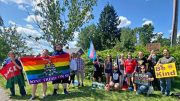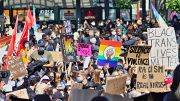WASHINGTON—Today, the U.S. Supreme Court heard oral arguments in the case U.S. v Texas. The case challenged President Obama’s Executive Actions on immigration, which expanded the Deferred Action for Childhood Arrivals (DACA) program and created a new Deferred Action for Parental Accountability (DAPA) program.
The National Queer Asian Pacific Islander Alliance (NQAPIA), with the pro bono assistance of McDermott Will & Emery LLP, had filed an amicus (“friend of the court”) brief in the case illustrating the impact of the case on the lesbian, gay, bisexual, and transgender (LGBT) community.
The Brief can be found here.
NQAPIA’s co-counsel James Kim at McDermott Will & Emery LLP sat in the courtroom to hear oral argument. An update will be provided.
The President’s immigration programs could help up to 5 million undocumented immigrants, including 400,000 Asians, to be free from deportation and gain work authorization. An estimated 267,000 undocumented immigrants are LGBT, of which a disproportionate share is API.
“NQAPIA’s brief shows the Supreme Court how immigration laws and policies have a direct impact on the lives of LGBT people. It also demonstrates the ethnic diversity of the undocumented immigrants, telling the stories of LGBT Asian Americans and Southeast Asians,” said Glenn D. Magpantay, NQAPIA Executive Director.
NQAPIA’s brief strategically draws upon the Court’s reasoning in Obergefell v. Hodges, where LGBT-friendly Justice Kennedy ruled that the Constitution protect same-sex couples to legally marry. The brief discusses the human dignity of LGBT people and the protection of children of LGBT parents. Where the Court holds that same-sex marriage protects LGBT families, NQAPIA argues that the expanded DACA and DAPA programs also protects LGBT families. Family is especially strong among Asian Americans and Pacific Islanders.
NQAPIA’s brief highlights the stories of LGBT Asian immigrants.
- Sandra Meetran is a 16 year-old student in Rhode Island. She is a citizen but her father was deported to Laos when she was younger which made her coming out much more challenging. Her family would have benefitted from DAPA.
- Jose Antonio Vargas is a 34 year-old Pulitzer-prize winning journalist, filmmaker, and media producer. Jose is undocumented and entered the U.S. when he was 12 from the Philippines. Because he is now over 30, he is ineligible to apply for deferred action from deportation, but could apply for the expanded DACA.
- Tony Choi is a 24 year-old gay Korean undocumented beneficiary of the original DACA program (for those under 30) from New Jersey. In 2010, his options were to live a closeted life taking care of this mother with cancer or return to Korea where his LGBT identity would subject him to harsh hazing for two years in the mandatory military service. He successfully applied for DACA and has helped dozens of other undocumented youth apply for DACA and continued fighting against deportations.
These stories demonstrate how the expanded DACA and DAPA programs protect LGBT APIs from harassment, discrimination and hardship.
The brief shows how the lower court’s suspension of the programs place LGBT families in extremely difficult circumstances. Undocumented LGBT parents and children must (a) return to their home countries where LGBT people are persecuted, jailed, and even sentenced to death or (b) parents must leave the United States and abandon their children without any or with minimal family support. The expanded DACA and DAPA programs allow undocumented LGBT individuals and LGBT individuals with undocumented family members to stay in the U.S. and keep families together.
Lower courts suspended the immigration programs. The programs would specifically benefit undocumented immigrants over 30 years old who entered the United States as minors (expanded DACA) and undocumented parents of citizen and legal permanent resident children (DAPA). http://www.nqapia.org/wpp/immigration-relief-facts-2015/
Joining NQAPIA as co-signers to the brief are variety of LGBT organizations from various regions of the county, various ethnicities, allies, and youth and transgender groups.
Local LGBT Asian/ South Asian organizations
Asian Pacific Islander Pride of Portland
Gay Asian and Pacific Islander Men of New York
Gay Asian Pacific Alliance – San Francisco
hotpot! Philadelphia
Queer Asian Pacific-Islander Alliance (QAPA) Boston
SALGA-NYC
United Territories of Pacific Islanders Alliance (UTOPIA) Seattle
Local Organizations
API Chaya – Seattle
Bay Area Lawyers for Individual Freedom (BALIF)
Familia: Trans Queer Liberation Movement – Los Angeles
New York City Lesbian, Gay, Bisexual and Transgender Community Center
VAYLA (Vietnamese American Young Leaders Association) – New Orleans
National LGBT organizations
Immigration Equality
National Center for Transgender Equality
National LGBTQ Task Force
PFLAG National
Services and Advocacy for GLBT Elders (SAGE)
Southerners On New Ground (SONG)
The Trevor Project
Transgender Law Center
Last April 2015, NQAPIA and local groups organized a National Week of Action on Immigrants’ Rights protesting the US v. Texas lawsuit in New Orleans and New York City.
The National Queer Asian Pacific Islander Alliance (NQAPIA) is a nationwide federation of LGBT Asian American, South Asian, Southeast Asian, and Pacific Islander (AAPI) organizations. We seek to build the organizational capacity of local LGBT AAPI groups, develop leadership, and expand collaborations to better challenge homophobia and racism.
[From a News Release]







